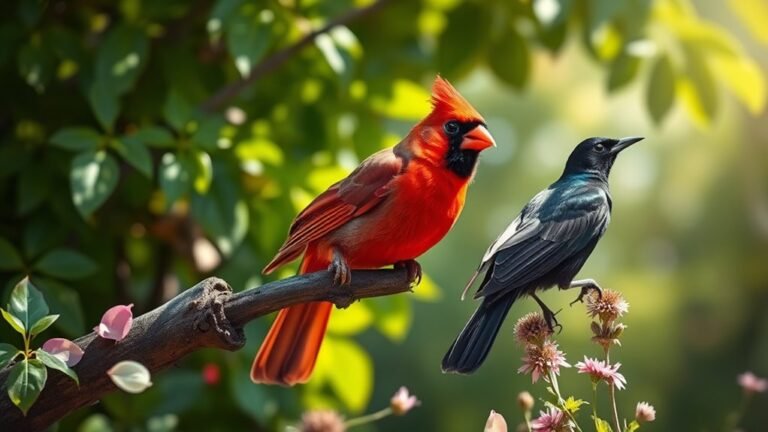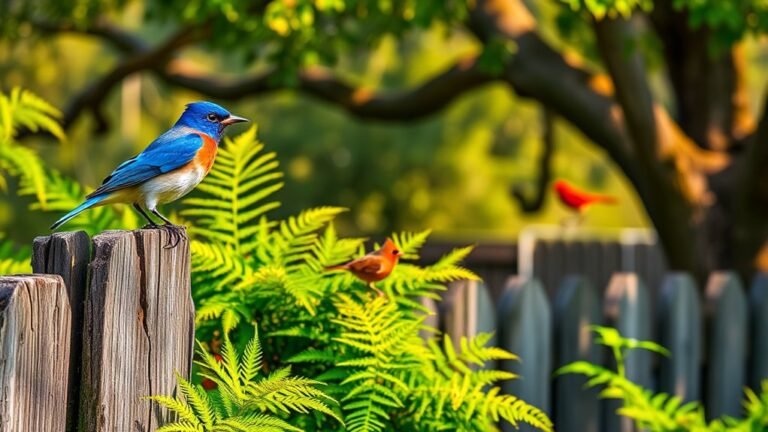North Carolina Backyard Birds
North Carolina has many backyard birds that play important roles in the local environment. You can see birds like the Northern Cardinal and the Eastern Bluebird. To attract these birds to your garden, you need to do more than just set up feeders.
Here are specific steps to create a welcoming space for these beautiful birds:
- Provide Food: Use feeders filled with seeds that birds enjoy, such as sunflower seeds or millet.
- Offer Water: Place a birdbath or shallow dish with clean water for birds to drink and bathe.
- Create Shelter: Plant native shrubs and trees. They offer cover and nesting sites for birds.
- Add Nests: Install birdhouses that cater to local species. Make sure they suit the size and preferences of the birds you want to attract.
- Limit Pests: Keep your garden free from pesticides. This helps maintain a healthy environment for the birds.
By following these steps, you can build a lively backyard habitat that brings joy and color to your space.
Key Takeaways
- Common North Carolina backyard birds include the American Robin, Eastern Bluebird, and Northern Cardinal, each with unique features and songs.
- Plant native vegetation to provide food and shelter, attracting a diverse range of bird species to your yard.
- Install feeders with seeds like black oil sunflower to cater to local birds and enhance your garden's appeal.
- Maintain clean bird baths to encourage drinking and bathing, making your garden a more inviting space for birds.
- Observe seasonal changes in bird behavior, such as migration and nesting habits, to deepen your connection with local wildlife.
Common Backyard Birds of North Carolina

In North Carolina, you can find many common backyard birds that enhance the local environment and bring joy to birdwatchers. Identify species like the American Robin, Eastern Bluebird, and Northern Cardinal.
Each bird has unique features, colors, and songs that enrich your outdoor experience.
Know the habitat preferences of these birds. For example, Bluebirds like open fields with low plants, while Cardinals prefer thicker shrubs.
Watching these birds helps you connect with nature and your community. By recognizing and appreciating them, you support their conservation and play a vital role in your environment.
Enjoy your birdwatching!
Attracting Birds to Your Garden
Attracting birds to your garden is simple and rewarding. Start by planting native plants. These plants provide food and shelter for local birds.
Choose a mix of shrubs, flowers, and grasses to support different species.
Add a bird bath. Birds need fresh water for drinking and bathing. Ensure the bath is shallow and placed in a safe spot.
Keep it clean to encourage birds to visit.
Install feeders filled with seeds that your target birds enjoy, such as finches and cardinals.
The Importance of Birds in the Ecosystem

Birds are important for the ecosystem. They help keep nature balanced in several ways.
Various bird species provide unique benefits to their surroundings. They control pests by eating insects, which can protect your garden without the need for chemicals. Some birds also pollinate flowers and promote biodiversity.
By spreading seeds, they support new plant growth, creating homes for other wildlife. Understanding these connections helps you appreciate the birds in your area.
Their presence improves the beauty of your garden and supports the life systems that sustain our environment.
Feeding Backyard Birds: What You Need to Know
Feeding backyard birds can be a rewarding hobby. It supports local wildlife and enhances your garden's appeal.
To attract various birds, choose the right seeds. Black oil sunflower seeds are favored by many species. Nyjer seeds attract finches. Use different types of feeders for different birds. Platform feeders and tube feeders are great choices for diverse seeds. Hummingbird feeders filled with nectar attract these vibrant visitors.
Regularly clean your feeders to prevent disease and ensure they provide fresh food.
Nesting Habits of North Carolina Birds

Understanding the nesting habits of North Carolina birds is important for anyone who wants to help these birds. During the breeding season, many birds look for places to build their nests. They often choose trees, shrubs, or man-made structures. Common materials for nests include twigs, grass, feathers, and mud.
Each bird species has its own preferences. For instance, Carolina wrens like dense areas, while American robins choose open branches. Observing these nesting habits helps you appreciate the birds and guides you in creating a supportive environment.
Seasonal Changes in Bird Behavior
As the seasons change in North Carolina, bird behavior shifts noticeably. Many birds migrate to warmer areas in the fall and return in spring when days get longer. This migration occurs due to changes in temperature and food availability. Some birds travel long distances to find suitable habitats.
You can also see changes in bird diets throughout the year. In summer, birds eat insects and berries. In winter, they rely on seeds and stored food.
Recognizing these patterns helps you appreciate local wildlife and connect with the ecosystem. By observing these seasonal changes, you join a community of bird watchers.
Birdwatching Tips for Beginners
Whether you're new to birdwatching or want to improve your skills, having a good plan can make your experience better.
Start by getting the right gear, like binoculars and field guides, to help you identify birds accurately. Learn basic observation skills—stay quiet, use natural cover, and watch during early morning or late afternoon to spot more birds.
Keep a journal of your sightings, noting the behavior and habitat of each species. Join local birdwatching groups to connect with others and share experiences.
Fun Facts About North Carolina's Avian Species
North Carolina has many bird species, making it a great place for birdwatchers. The state features various songbirds, each with special traits.
Here are some interesting facts:
- Migration Patterns: Many birds stop in North Carolina during migration, especially along the Atlantic Flyway.
- Unique Habitats: The state has different ecosystems, from mountains to beaches, attracting many kinds of birds.
- State Bird: The Northern Cardinal is North Carolina's state bird. It's famous for its bright color and pleasant song.
- Year-Round Residents: Some birds, like the Carolina Wren, stay in North Carolina all year. They add joyful sounds to your backyard.
Explore these facts to enhance your birdwatching experience!
Frequently Asked Questions
What Are the Best Times to Observe Birds in North Carolina?
To observe birds in North Carolina, visit in the morning. Birds are active during this time as they feed and sing. Evening is another good time to see birds as they get ready to roost. These moments are perfect to enjoy their beauty and behaviors.
Are There Any Endangered Bird Species in North Carolina?
North Carolina is home to several endangered bird species, such as the Red-cockaded Woodpecker and the Piping Plover. Protecting their habitats is essential for their survival. Supporting conservation efforts helps ensure these birds can thrive for future generations.
How Can I Identify Bird Species by Their Songs?
To identify bird species by their songs, pay attention to their patterns. Listen for changes in pitch and rhythm. Use apps and online resources to help improve your skills. These tools can deepen your appreciation for nature and make birdwatching more enjoyable.
Do North Carolina Birds Migrate During the Winter?
Yes, many birds in North Carolina migrate during the winter. They leave colder areas to find warmer places with more food. You can observe which species migrate and which stay all year. Watching birds can be an enjoyable activity that connects you to nature.
What Local Organizations Support Bird Conservation Efforts?
Local organizations support bird watching and conservation. By joining these groups, you connect with other bird lovers. You also help protect bird habitats and ensure their survival. Participating in events and activities can enhance your knowledge and enjoyment of birds. Get involved and make a difference for our feathered friends.

Hello, I’m Amelia White, the founder of birdsfanatic.com. As a lifelong bird enthusiast and spiritual seeker, I’ve always been fascinated by the mystical connections between birds and the human experience. On this site, I share my knowledge and insights into the symbolic meanings and spiritual significance of various bird species, exploring their roles in mythology, folklore, and cultural traditions. Join me on this journey into the world of birds, where we’ll discover the hidden wisdom and guidance that these magnificent creatures have to offer.






